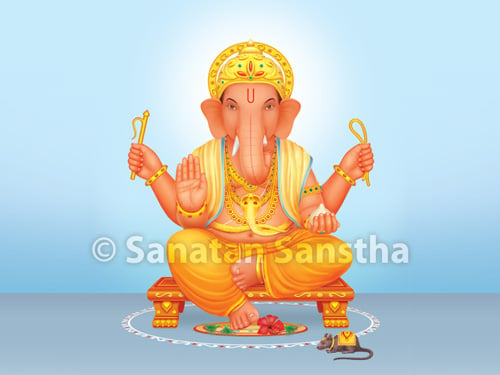This article explains clarifies various questions related to ritualistic worship of Shri Ganesh and Shri Ganesh Chaturthi.
1. Why is Shri Ganesh worshipped
before a puja (Ritualistic worship) or
before commencing any auspicious task ?
Gana is a group of the eight Vasus (Deities of directions). Shri Ganesh is the nurturer, Swami (Master) of the directions. (According to one school of thought, Shri Ganesh is the master of the ten directions. The upward and downward directions along with the eight directions constitute the ten directions.) Other deities cannot reach the site of puja from any direction without His permission. Hence, any auspicious task or the ritualistic worship of any other Deity is commenced with the ritualistic worship of Shri Ganesh. Once Shri Ganesh clears the directions, the deity one is worshipping can manifest itself there. This itself is referred to as Mahadvarpujan or Mahaganapatipujan.
2. What is the significance of Mahaganapati ?
Shri Ganesh along with Riddhi and Siddhi (Shakti [Divine Energy]) is Mahaganapati. Shri Ganesh created by Devi Paravati is an Incarnation of Mahaganapati. She sculpted a form out of mud and invoked the Shri Ganesh Principle into it. Before the creation of the universe, since the Mahat (Supreme God) Principle existed in a nirgun (Non-materialised) and eternal form, it is called Mahaganapati. When Mahaganapati is worshipped to seek a specific supernatural power or purely for attainment of Moksha (Final Liberation), it is customary to choose a Shri Ganesh Idol with the trunk curved towards the right. However, in such circumstances, as far as possible, the Idol is made of earth. Rarely do we come across gold and silver Shri Ganesh Idols with the trunk curved towards the right.
3. What is the reason behind not
offering tulsi (Holy basil) leaves to Shri Ganesh
A. Reason according to Puranas
A celestial singer was very beautiful. She wished to have a good husband. To fulfil her wish, she was always resorting to acts like fasting, chanting, performing vrats (Vowed religious observances), going on pilgrimages etc. Once she saw Shri Ganesh engrossed in meditation. She instantly fell in love with Him. To awaken Him from meditation, she called Him, “O Ekadanta, O Lambodar, O Vakratunḍa !” Because of the interruption in meditation, Shri Ganesh opened His eyes. Seeing the celestial singer in front of Him, He said, “O Mother, why are you interrupting my meditation ?” To this she replied, “I like you very much. I want to marry you”. Shri Ganesh replied, “I will never marry and get entrapped in noose of attachment” To this, the singer said, “I curse you that you will marry for sure”. Shri Ganesh cast a counter curse, “You will become a tree on earth”. The singer regretted her behaviour and said, “Please forgive me”. Shri Ganesh said, “O Mother, Shrikrushna will marry you and you will be happy”. The celestial singer took birth as a tulsi plant on earth. Shri Ganesh never patronized the tulsi plant; hence, the tulsi leaves are never offered to Him.
B. Other reasons
Shri Ganesh is a Deity mainly worshipped with expectations; whereas, the tulsi plant represents detachment; hence, offering of tulsi leaves to Shri Ganesh is prohibited.
4. What should be done if Idol of Shri Ganesh gets damaged ?
If an organ or a part of the Idol gets damaged before its consecration or after showering it with akshata to remove the divinity from it before immersion, then there is no need to worry. If any part of the Idol is damaged before its consecration, the Idol should be replaced by another; whereas if it is damaged after the divinity is lost, the Idol should be immersed as usual. If the Idol is damaged after consecration, it should be immersed after showering akshata on it. If this occurs on the day of Shri Ganesh Chaturthi, worship a new Idol. However, if it occurs on the second or third day of Shri Ganesh Chaturthi, there is no need to do so. If the Idol is damaged completely, with the advice of the family priest, perform the ritual of ‘Adbhutdarshan shanti’ as per convenience. If an ill-omen like falling of a lit lamp, breaking of the grinding stone, flowering of a cress plant, and damage to an Idol etc. occurs, it is beleived that they are indicative of an impending financial loss, a serious illness or an untimely death in the family. Hence, the above remedy should be undertaken with faith.
Reference : Sanatan Sanstha’s Holy text ‘Shri Ganapati’.


